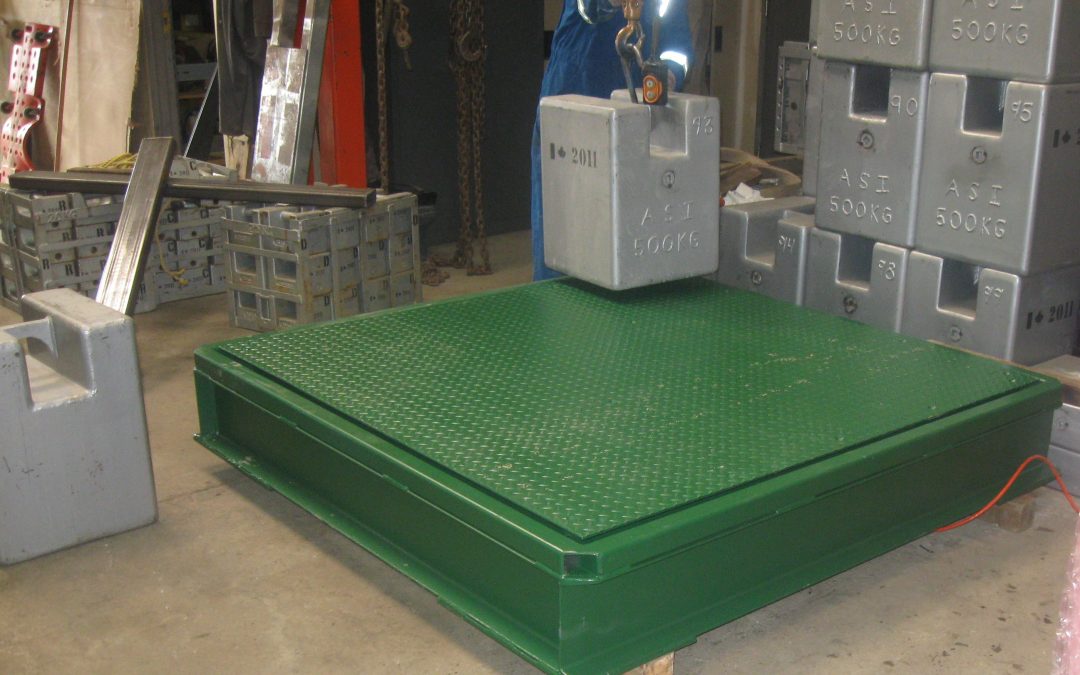When it comes to industrial applications, both floor scales and bench scales are among the most popular weighing devices on the market. These scales both offer easy-to-use designs and straightforward functionality across a wide variety of industries. From manufacturing facilities to construction worksites, these scales are indispensable to daily operations. But while both bench and floor scales share similar versatility, these two options often serve different purposes depending on the task.
Explore with us at Accurate Scale, as we explore these two types of scales, including benefits, features, and which options may be the best investment for you. Let’s “weigh” out these options together!
What is a Floor Scale?
A floor scale is among the largest of commercially available scales. These weighing devices sit directly on the floor and are designed for high-capacity loads. Floor scales are most commonly found in warehouses, manufacturing plants, and other industrial businesses which regularly deal with extremely heavy loads.
What is a Bench Scale?
A bench scale, on the other hand, is a much smaller, more compact device. Unlike ground-sitting floor scales, bench scales are often placed on benches (hence the name), desks, tables or other working surfaces. These scales come in a wide variety of designs, including the larger platform scales with column displays and the more compact, fully-integrated bench scales. Bench scales have a wide range of applications, and are commonly used in restaurants, warehouses, packaging facilities, and more.
Considerations Before Choosing
Before you invest in a bench scale or floor scale, there are several factors to consider. While many models can be certified for Legal for Trade use, other considerations are just as important.
The most common factor to consider is average load size, and it’s easy to see why. Scales have established weight capacities in order to protect load cells from overloading. If load cells are frequently over capacity, issues like accuracy drifting can occur. Floor scales have a significantly higher capacity than bench scales, making them ideal for larger, rugged loads like crates, shipping containers, construction equipment, and more. Our in-house manufactured Extreme-Duty Platform Scale is ideal for even the heaviest loads, supporting up to 40,000lbs with ease.
Here are a few other key factors to consider when choosing your scale:
Portability: Will you need to move your scale? If so, how often?
- Bench scales are significantly easier to move from location to location, while floor scales may need multiple people and/or equipment.
Loading Method: How will you be putting your load on the scale?
- A standard floor scale may require ramps, lifts, or other equipment to load it effectively. The smaller loads for bench scales are typically hand-loaded.
Weight Resolution: How fine do you need the measurement to be?
- Bench scales offer more granular measurements, down to grams for some models. Floor scales, on the other hand, are designed for larger, coarser measurements.
Which Scale Should You Choose?
When it comes to choosing the right scale for your business, it all comes down to personal preference. But overall, if portability matters more than weight capacity, you’re best bet is likely a bench scale. On the other hand, if you’ll be weighing extremely heavy loads regularly and won’t need to move your scale too often, a floor scale is the better choice.
We’re Your Local Scale Experts
At Accurate Scale, we take our name seriously—we’re proud to manufacture and supply truly cutting-edge weighing solutions. Visit our website today to see our selection of bench scales, floor scales, and more. Don’t see what you’re looking for? Reach out to us today for expert care, unparalleled service, and the most up-to-date information on our stock.

